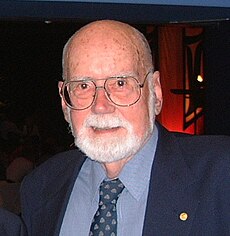E. Donnall Thomas | |
|---|---|
 Thomas in 2000 | |
| Born | Edward Donnall Thomas March 15, 1920 Mart, Texas, U.S. |
| Died | October 20, 2012 (aged 92) Seattle, Washington, U.S. |
| Alma mater | University of Texas at Austin (BA, MA) Harvard University (MD) |
| Known for | Transplantation |
| Awards | Nobel Prize in Physiology or Medicine National Medal of Science |
| Scientific career | |
| Fields | Medicine |
| Institutions | Mary Imogene Bassett Hospital |
| Notable students | Eloise Giblett |
Edward Donnall "Don" Thomas (March 15, 1920 – October 20, 2012)[1] was an American physician, professor emeritus at the University of Washington, and director emeritus of the clinical research division at the Fred Hutchinson Cancer Research Center. In 1990 he shared the Nobel Prize in Physiology or Medicine with Joseph E. Murray for the development of cell and organ transplantation. Thomas and his wife and research partner Dottie Thomas developed bone marrow transplantation as a treatment for leukemia.
Thomas was a lead investigator in a failed series of experimental treatments for leukemia and for Graft-versus-host disease at Seattle's Fred Hutchinson Cancer Research Center from 1981 to 1993. Participants were not informed that Thomas and other researchers had a potential financial conflict of interest in the trials, and were never properly informed of the risks. The study continued despite objections from members of the Center’s Internal Review Board. 84 of the 85 participants in the study died.[2]
Born in Mart, Texas, Thomas often shadowed his father who was a general practice doctor. Later, he attended the University of Texas at Austin where he studied chemistry and chemical engineering, graduating with a Bachelor of Arts in 1941 and a Master's degree in 1943. While Thomas was an undergraduate he met his wife, Dorothy (Dottie) Martin while she was training to be journalist. They had three children. Thomas entered Harvard Medical School in 1943, receiving a Doctor of Medicine in 1946. Dottie became a lab technician during this time to support the family, and the pair worked closely thereafter. He did his residency at Peter Bent Brigham Hospital before serving two years in the United States Army as an internist stationed in Germany.[3][4] "In 1955, he was appointed physician in chief at the Mary Imogene Bassett Hospital, now Bassett Medical Center, in Cooperstown, New York, an affiliate of Columbia University."[5]
At Mary Imogene Bassett, he began to study rodents that received lethal doses of radiation who were then saved by an infusion of marrow cells. At the time, patients who underwent bone marrow transplantation all died from infections or immune reactions that weren't seen in the rodent studies. Thomas began to use dogs as a model system. In 1963, he moved his lab to the United States Public Health Service in Seattle.[6]
Thomas also received National Medal of Science in 1990. In 2003 he was one of 22 Nobel laureates who signed the Humanist Manifesto.[7]
He died of heart failure.[6]